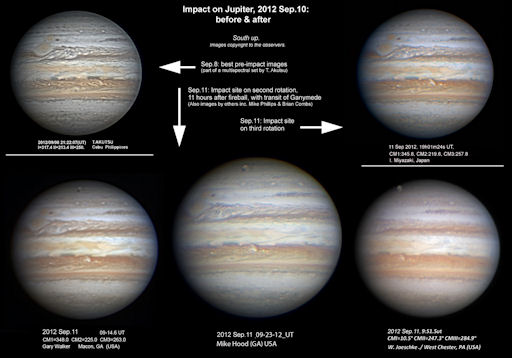Around the world, amateur astronomers have been scanning the cloudtops of Jupiter for signs of debris from an explosion witnessed by Dan Peterson and George Hall on Sept. 10th. So far the cloud layer is blank. "Several observers have now obtained excellent images on the second and third rotations after the fireball, and there is nothing new nor distinctive at the impact site," reports John H. Rogers, director of the Jupiter Section of the British Astronomical Association:
The fireball was probably caused by
a small asteroid or comet hitting Jupiter. Apparently,
the giant planet swallowed the impactor whole.
When fragments of Comet Shoemaker-Levy
9 hit Jupiter in 1994, each major flash observed
by NASA's Galileo spacecraft produced a "bruise,"
a murky mixture of incinerated comet dust and chemically
altered Jovian gas twisting and swirling among the
clouds. In July 2009, amateur astromer Anthony Wesley
discovered a
similar mark thought to be debris from a rogue
asteroid crashing into the planet.
So where is the debris this time? Perhaps the impactor
was small, packing just enough punch to make a flash,
but without leaving much debris. Indeed, studies
suggest that Jupiter is frequently struck by
relatively small 10-meter-class asteroids. In such
cases, minimal debris is to be expected.Stay tuned for updates in case something surfaces.
Look's like the giants of our solar system are doing what they were made for.





"...are doing what they were made for"
ReplyDelete...divine intervention...
...Created, by The Almighty
...every thing has a purpose huh brother?
That's right Ken, intelligent design. God plans very well. Stay safe brother.
ReplyDelete